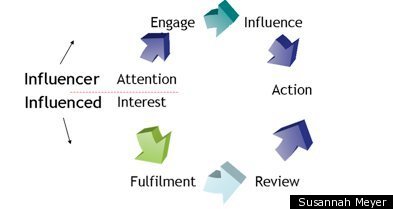On the morning of Thursday, December 8, an article I wrote for HuffPost High School was published. That night, when I went to check back on the article, a couple of people had tweeted about it. A smile came over me, and I had felt satisfied. At the moment, I hadn't realized exactly why, though. The next day, 80 more people had tweeted about it, 30 more people had liked and shared it on Facebook, and 8 people had commented on it.
When I had the chance to look over those comments and tweets, an even greater sense of contentment came over me. I realized then it was because I had influenced people. Influence was what provoked them toward tweeting and re-tweeting, sharing and re-sharing. Although some of those comments or posts did not necessarily agree with what I had to say, that didn't matter. What did matter was that, either way, I had evoked some meaningful thought and brought out a formation of opinion.
I have been considering, from then on, how to keep that feeling of influencing others and of being influential. What I have come up with is a list of steps to obtain that feeling, and keep it.
First, ask yourself why you want to be influential in the first place. Do you want to make a difference? Do you want to have your ideas heard and put into action? Do you want to share your own revelation? Do you just want to be heard? Or do you simply want to start a career? Before you influence people, you have to have a purpose to do so. In my case, I want to show people what someone my age is capable of, I want to get involved, and I want to be heard.
Next, find a platform to speak your words and have them heard. You can be influential from virtually anywhere -- at home, at your school, or in your community. In my opinion, the best platform for your voice is the Internet. Aside from the social intentions of social media, sites like Facebook, Twitter, or Google+ are great ways to be heard by millions of people simultaneously.
After you know how or where you can say something, say it. But, don't just say something to say it. Social media sites can act as amplifiers, but you have to have something to say first.
The next step I have come across is to be seen, heard, or found. To influence someone, he or she must first know what it is you do, then agree with it or like it, and finally start to advocate for it. This may sound easy, but if no one's listening to you, you're not speaking to anyone. To be heard, I would take advantage of all social media, posting frequently but not excessively, and relating your posts to how and why you want to influence people. Also, make it a conversation. Listen to what other people have to say, and then respond with more influence.
Finally, I think it's most important to be yourself. Stick to your mission and your opinion, and try to influence people on that, and get them aware of it. Don't be too influenced by other people to change your opinion.
That brings me to my next point. Peer pressure, trending topics -- they're all the same. They are both forms of influence. Of course, being influenced by people's innovative ideas is something that can spark your own innovation. But sometimes, that influence can compromise your individuality. People often lead others toward believing that in order to be creative or have your own opinions, you have to be inspired or stimulated from some outside source. Teachers constantly ask students what their inspiration is. Well, what if your thoughts are influenced or inspired?
In order to influence without changing your purpose and ideas from the influence of others, you have to approach your platform -- social media, for example -- like an abstract artist would a canvas: with no preconceived notions of what something 'should' be or look like. I actually think it would help just to look at what everyone else has to say. If you genuinely agree with something, say that. But if not, then you should go back to the drawing board, erase everything, and create something that wraps your opinions around it. It is difficult, but if you just let yourself draw, write, or speak automatically, and let your stream of unconsciousness flow, you will be amazed at what can happen.
